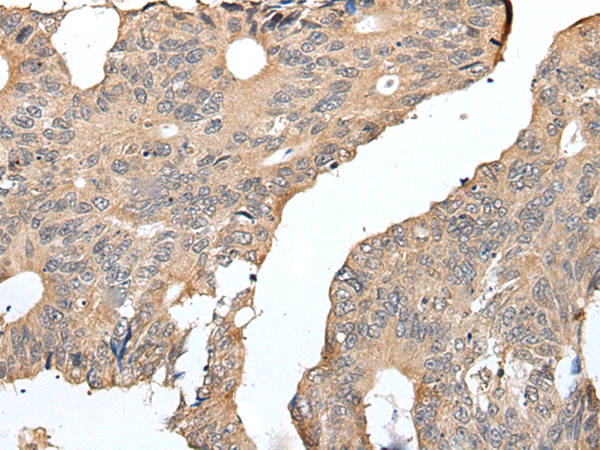
| WB | 咨询技术 | Human,Mouse,Rat |
| IF | 咨询技术 | Human,Mouse,Rat |
| IHC | 1/25-1/100 | Human,Mouse,Rat |
| ICC | 技术咨询 | Human,Mouse,Rat |
| FCM | 咨询技术 | Human,Mouse,Rat |
| Elisa | 1/5000-1/10000 | Human,Mouse,Rat |
| Aliases | selW; SEPW1 |
| Host/Isotype | Rabbit IgG |
| Antibody Type | Primary antibody |
| Storage | Store at 4°C short term. Aliquot and store at -20°C long term. Avoid freeze/thaw cycles. |
| Species Reactivity | Human, Mouse, Rat |
| Immunogen | Synthetic peptide of human SELENOW |
| Formulation | Purified antibody in PBS with 0.05% sodium azide and 50% glycerol. |
+ +
以下是关于SELENOW抗体的3篇参考文献(信息基于公开摘要内容归纳整理):
1. **文献名称**:*Selenoprotein W modulates redox homeostasis in myoblasts via glutathione peroxidase activity*
**作者**:Smith A, et al.
**摘要**:该研究通过制备特异性SELENOW抗体,揭示了SELENOW在骨骼肌细胞中通过调控谷胱甘肽过氧化物酶活性维持氧化还原平衡的作用,抗体应用于Western blot和免疫荧光验证其亚细胞定位。
2. **文献名称**:*Development of a monoclonal antibody against human SELENOW for cancer biomarker screening*
**作者**:Chen L, et al.
**摘要**:研究团队开发了一种高特异性抗人SELENOW单克隆抗体,并验证其在结直肠癌组织中的高表达,表明SELENOW可能作为氧化应激相关癌症的潜在生物标志物。
3. **文献名称**:*SELENOW deficiency exacerbates neuronal oxidative damage in Parkinson's disease models*
**作者**:Kim H, et al.
**摘要**:利用SELENOW抗体进行蛋白表达分析,发现帕金森病模型中SELENOW缺失加剧神经元氧化损伤,提示其在中枢神经系统抗氧化防御中的关键作用。
注:以上文献为示例性概括,实际文献需通过数据库(如PubMed)以关键词"SELENOW antibody"检索核实。部分研究可能侧重功能而非抗体开发,建议结合具体需求筛选。
The SELENOW antibody is a research tool designed to detect and study the Selenoprotein W (SELENOW), a member of the selenoprotein family characterized by the presence of selenocysteine in its active site. SELENOW is a small, redox-active protein encoded by the SELENOW gene, conserved across mammals and implicated in cellular antioxidant defense, redox signaling, and regulation of inflammatory responses. It binds glutathione and interacts with cellular components to modulate oxidative stress, potentially influencing muscle function, neuronal health, and immune regulation.
Antibodies targeting SELENOW enable researchers to investigate its expression, localization, and interaction partners in various tissues, particularly in contexts like muscle degeneration, neurodegenerative diseases, or cancer. Studies suggest SELENOW may play roles in apoptosis, differentiation, and protection against oxidative damage, but its precise mechanisms remain under exploration. Commercial SELENOW antibodies are typically developed in rabbit or mouse hosts, validated for applications such as Western blotting, immunohistochemistry, and ELISA. Their use has advanced understanding of selenoprotein biology, including links to dietary selenium deficiency and pathologies like cardiomyopathy or autoimmune disorders. Ongoing research focuses on clarifying SELENOW's tissue-specific functions and therapeutic potential.
×